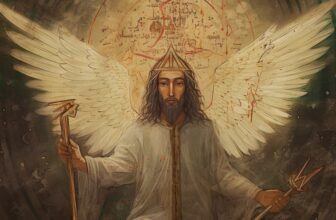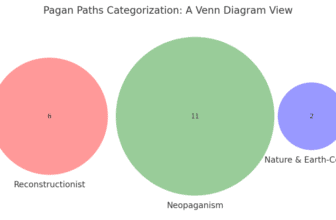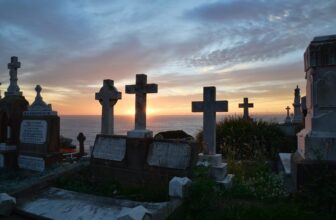
Table of Contents
Tisha B’Av, also known as “The Ninth of Av,” is a significant day of mourning and fasting in Judaism, commemorating several major tragedies in Jewish history. It’s a day on which the people of the Jewish faith commemorate not one but five great calamities that happened on the ninth day of the Av month throughout history as well as numerous other later events that were also tragic for the Jewish people.
So, let’s take a deeper look into the vast and complicated history behind Tisha B’Av and what it means for people today.
What Is Tisha B’Av And When Is It Commemorated?
As the name implies, Tisha B’Av is celebrated on the ninth day of the Av month of the Jewish calendar. On the rare occasion that the 9th happens on the Sabbath, the holy day is moved by one day and is commemorated on the 10th.
It’s also worth mentioning that the official start of Tisha B’Av is actually the evening of the previous day. The holy day lasts 25 hours – until the evening of Tisha B’Av itself. So, even if the first evening happens to be on a Sabbath, that’s not a problem. As most of the fasting and prohibitions related to Tisha B’Av still take place on the day after the Sabbath – more on the prohibitions themselves below.
In the Gregorian calendar, the Ninth of Av usually happens in late July or early August. For example, in 2022 Tisha B’Av took place from the evening of August 6 to the evening of August 7. In 2023, the holy day would be commemorated between the evening of July 26 and the evening of July 27.
What Are The Main Tragedies Remembered And Mourned On Tisha B’Av?
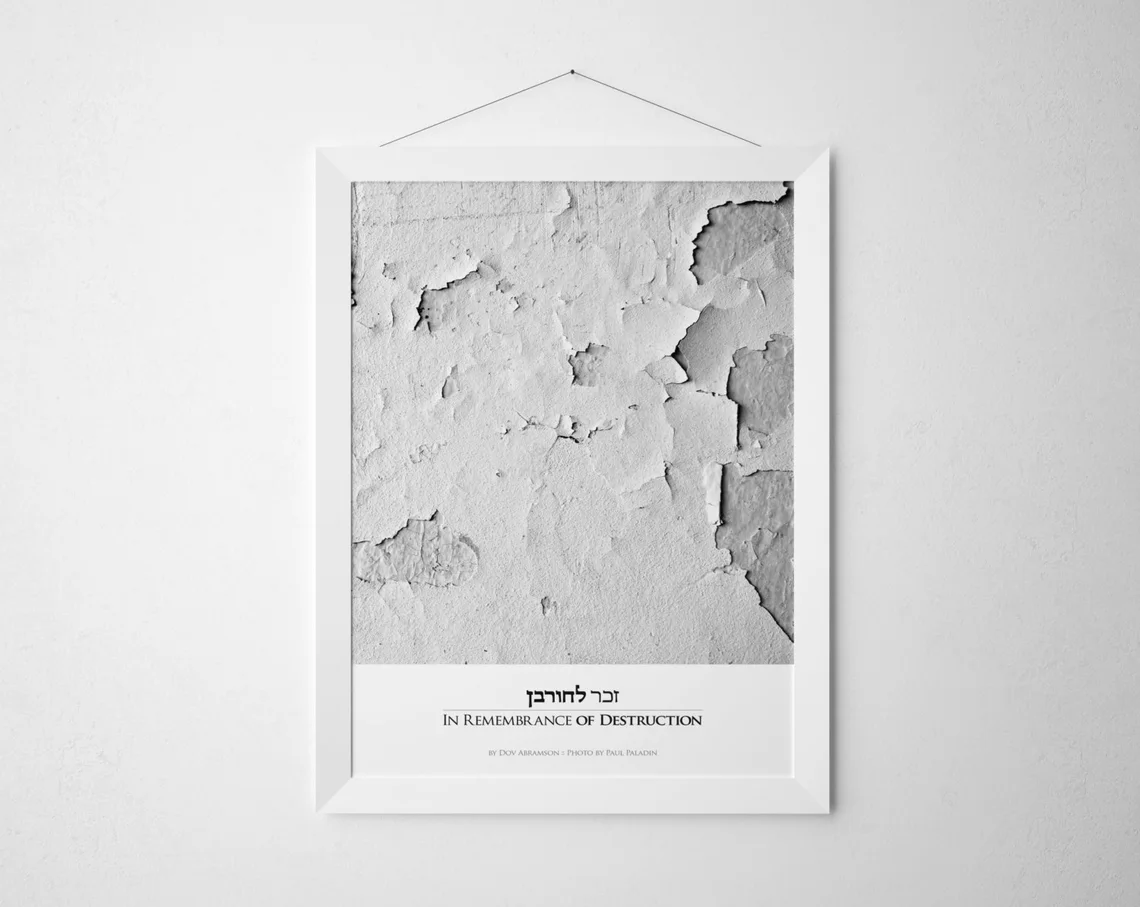
Traditionally, and according to the Mishnah (Taanit 4:6), Tisha B’Av marks five great calamities that had befallen the Hebrew people over the years. These include the following.
1. The First Calamity
According to Numbers Rabbah, after the Hebrew people escaped the Egyptian Pharaoh Ramses II and started roaming the desert, Moses sent 12 spies to observe Canaan, the Promised Land, and report if it was indeed suitable for the Children of Israel to settle in. Of the 12 spies, only two brought back positive news. The other 10 said Canaan wasn’t the right land for them.
This bad news brought the Children of Israel to despair, leading to God chastising them that “You cried before me pointlessly, I will fix for you [this day as a day of] crying for the generations”. In other words, this overreaction by the Hebrew people is why God decided to make the Tisha B’Av day forever full of misfortunes for them.
2. The Second Calamity
This came in 586 BCE when the First Temple of Solomon was destroyed by the Neo-Babylonian Emperor Nebuchadnezzar.
There are conflicting reports on whether the destruction took several days (between the 7th and the 10th of Av) or just a couple of days (the 9th and 10th of Av). But it seems to have included the Ninth of Av in either way, so, this is the second calamity remembered on Tisha B’Av.
3. The Third Calamity
The Second Temple – or Herod’s Temple – was destroyed centuries later by the Romans in 70 AD. Initially built by Nehemiah and Ezra, the destruction of the Second Temple also marks the start of the Jewish Exile from the Holy Lands and their scattering across the world.
4. The Fourth Calamity
A few short decades later, in 135 AD, the Romans also crushed the famous Bar Kokhba Revolt. They also destroyed the city of Betar, and killed over half a million Jewish civilians (approximately 580,000 people). This happened on August 4 or the Ninth of Av.
5. The Fifth Calamity
Immediately after the Bar Kokhba Revolt, the Romans also plowed through the site of the Temple of Jerusalem and the entire area around it.
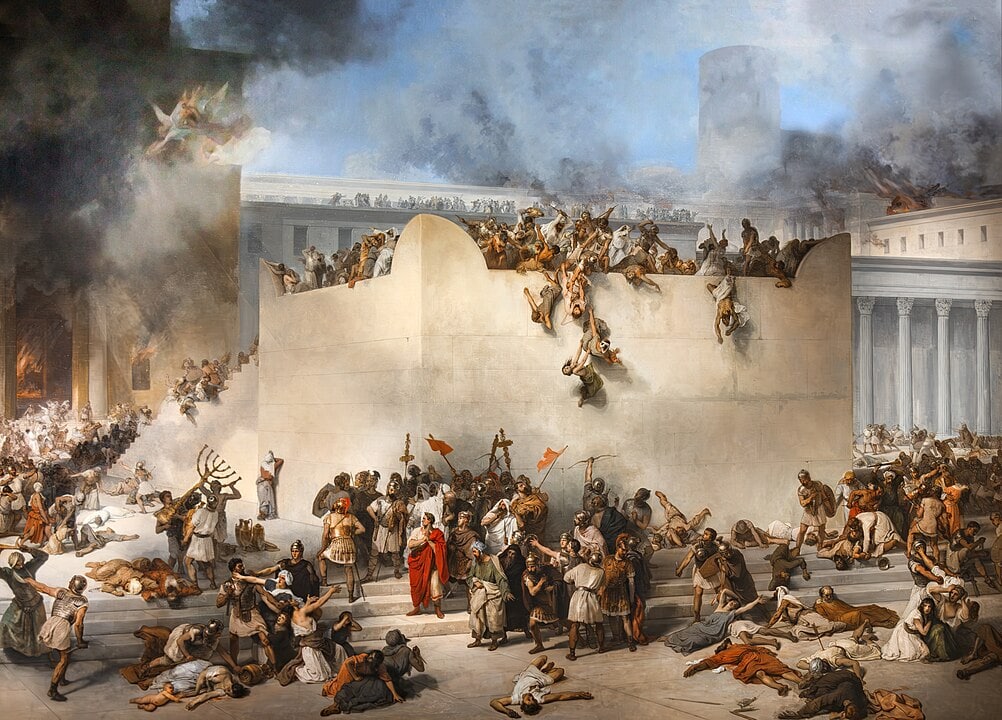
Other Tragedies
These are the main five calamities marked and mourned by the Jewish people every year on Tisha B’Av. However, over the next 19 centuries, there have been lots of other tragedies and instances of prosecution. Many of which also just so happened to coincide with the Ninth of Av. So, modern-day commemorations of Tisha B’Av also tend to mention them. Some examples include:
- The first Crusade declared by the Roman Catholic church began on 15 August 1096 (Av 24, AM 4856) and led to the killing of over 10,000 Jews as well as the destruction of most Jewish communities in France and the Rhineland
- The Jewish community was expelled from England on 18 July 1290 (Av 9, AM 5050)
- The Jewish community was expelled from France on 22 July 1306 (Av 10, AM 5066)
- The Jewish community was expelled from Spain on 31 July 1492 (Av 7, AM 5252)
- Germany’s participation in World War I began on 1–2 August 1914 (Av 9–10, AM 5674), leading to a huge upheaval in Jewish societies across Europe and paving the way for the Holocaust in World War II
- SS commander Heinrich Himmler officially received the go-ahead from the Nazi Party for “The Final Solution” on 2 August 1941 (Av 9, AM 5701)
- The mass deportation of Jews from the Warsaw Ghetto to Treblinka began on 23 July 1942 (Av 9, AM 5702)
- The bombing of the AIMA (Asociación Mutual Israelita Argentina) Jewish community of Argentina took place on 18 July 1994 (10 Av, AM 5754) and killed 85 people, injuring over 300 more.
As you can see, some of those dates don’t fall exactly on the Ninth of Av while others are a part of larger years-longs events that could have been assigned to any day of the year. Additionally, there are thousands of other dates of terrorist attacks. Examples of persecution against the Jewish people that are nowhere near the Ninth of Av.
While not all tragedies in Jewish history occurred on the Ninth of Av, this date has become a symbolic time for mourning and reflecting on various historical calamities that have impacted the Jewish community. It is certainly the day of some of the biggest tragedies in Jewish history.
What Are The Customs Observed On Tisha B’Av?
The main laws and customs that need to be observed on Tisha B’Av are quite straightforward:
- No eating or drinking alcohol
- No washing or bathing
- No use of oils or creams
- No wearing of leather shoes
- No sexual relations
Some additional customs include sitting on low stools only, not reading the Torah (as that’s seen as enjoyable), except for certain chapters that are allowed (as, apparently, they are not particularly enjoyable). Work is also to be avoided if possible, and even electric lights are expected to be turned off or at least dimmed.
Wrapping Up
Essentially, Tisha B’Av is observed as a major day of mourning for all Jewish people in the way most cultures across the world also commemorate such days of mourning.




